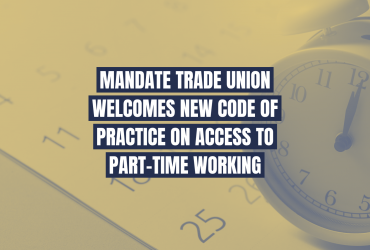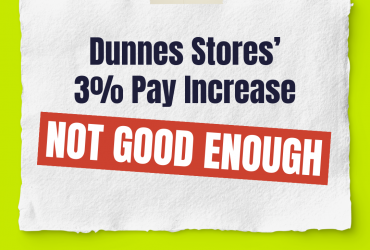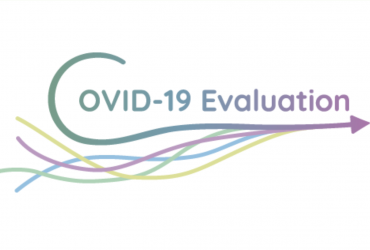Budget 2015 – The merry-go-round keeps turning but we need to talk about tax, pay, equality & social justice
Wednesday 1 October 2014
Many Irish people are starving. Poverty rates are soaring. Deprivation continues to rise. Ireland has a homelessness crisis with 40 families losing their home every month.
Suicide continues to scourge every town in the country. Unemployment remains unacceptably high. We have the largest class sizes in Europe. All linked with inequality. A perfect time to begin discussions about tax breaks for the wealthy.
And so it goes on, the political merry-go-round continues with no vision for our country’s future. We jump from election to election with political parties prioritising their re-election over the welfare of the people they’re supposed to represent.
Unfortunately, most groups, including parts of the trade union movement, have failed to articulate their vision of the type of society they want Ireland to become.
Inequality kills
Even fewer political parties have shown their vision for a fairer Ireland – one that embraces and cares for the most vulnerable. Employers, NGOs, some trade unions, political parties, and activist groups all campaign to protect their own patch, largely ignoring the challenge of our time – inequality.
Inequality kills more people in Ireland every year than suicide and motor accidents. In fact, according to the Institute for Public Health in Ireland, it kills about TEN times as many as both combined – at 6,500 people.
Yet inequality goes on unabated with our political parties exacerbating the problem (see Water charges – helping the wealthy become wealthier).
Budget 2015 provides – for the first time – some so-called wriggle room for the Cabinet.
Rather than address inequality, rather than focus on building houses instead of subsidising landlords, rather than creating real, decent jobs for our young people, rather than addressing any of the issues related to poverty, political parties play a crude game with our future. Justifying regressive decisions by insisting there is no alternative – when there clearly is.
The establishment just don’t want to debate it. They perpetuate the myth that we (they mean themselves) are overtaxed – when they know full well that Ireland is a low-tax economy.
But let’s look at tax. It costs money to run a country. We need schools, roads and hospitals. We need teachers, nurses and gardai. We want clean streets and we want running water. That all has a cost and somebody has to pay for it; the question is who?
When corporations pay ultra-low corporation tax, and employers pay ultra-low social security (PRSI), somebody has to make up the difference – either in tax payments or in personal sacrifice. Yet still our income taxation is around the EU average and it’s certainly not at the Scandinavian levels that some vested interests would have you believe.
So we make up the shortfall with regressive consumption taxes such as VAT and other charges. Of course, these affect those in the lowest income categories most.
High taxation isn’t the only myth perpetuated by the establishment.
We’re also constantly being told that we’re paid too much. Some of us may be, but certainly not all. In fact, Ireland is one of the lowest paying countries in the EU when you take into account the full employee compensation (pensions, PRSI etc).
This is mostly due to the fact that Irish employers pay about 50% less in social welfare contributions than their EU counterparts. At the same time they hide behind headline figures of an €8.65 minimum wage making European comparisons while refusing to debate total employee compensation.
In recent weeks, you could see all the usual suspects in full flow when new Minister Gerald Nash said he believed Irish workers needed a pay rise. He was immediately castigated by journalists and media outlets with a vested interest.
They instead argued for tax cuts along the lines of what Minister Noonan is proposing.
The employers’ bodies wouldn’t be left behind in the debate either and ISME’s Mark Fielding threw a few digs in saying Minister Nash’s comments would have a negative impact on job prospects.
He even went as far as to say the Taoiseach should “rein in the perpetrators” who called for pay increases.
It’s no wonder so few politicians profess a different vision for society. They’re afraid of attacks from employers and the media.
Neither the media nor the employers’ bodies, however, allow facts to get in the way of their agenda. Well, here are a few that all of us can use:
- If employers in Ireland paid the same PRSI rates as their counterparts in Europe do, it would raise an extra €6 billion for the economy.
- If Corporations paid the same rates as the average across the EU, we’d raise another €5 billion.
That’s €11 billion or, to put it in context, it’s 14 times what the water charges will take out of ordinary workers’ pockets. But I suppose it’s about values, choices and political power really.
Broken promises
Rather than have these debates, though, we go back to the political merry-go-round where we elect a government that breaks almost all of its promises, and in the final year or two before an election, they throw us the odd bone – such as tax cuts for their constituents or public sector pay restoration, while ignoring the inequality crisis and all the other crises.
We’re foolish enough to jump on that merry-go-round and continue down this path of little or no vision for our future.
In Mandate, we have a vision. We want more equality. We want a real debate – not squabbles on the radio or TV where one sector is pitched against another because it brings in the ratings. Let’s talk about taxation, pay, equality, social justice.
What we need are political champions for working people. Strong enough and brave enough to withstand the attacks from an establishment with a vested interest whenever they articulate a progressive vision for our country. When they do, they won’t be left wanting by Mandate or our members. Until then, the merry-go-round will continue and inequality will deepen.
Taken from Mandate’s Shopfloor. Click below for more articles.






